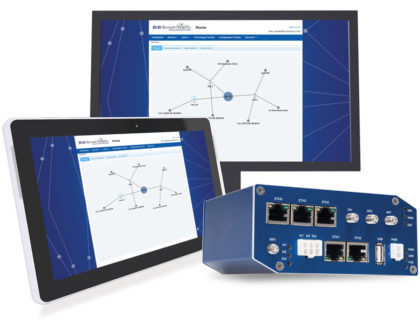USB: Adaptable for Industrial Applications
The Universal Serial Bus (USB) provides a high data rate and Hot Swap connection for PCs, providing an easy connection to a wide variety of multimedia and network USB devices. Generally considered to be for home or office use, USB is finding its way into Industrial applications.
What might USB offer the industrial environment? With USB, there is a medium bandwidth non-proprietary port made available on PC’s. USB data uses a multidrop, half-duplex twisted pair, similar in operation to a two-wire RS-485 system. This differential signaling offers a reasonable amount of noise immunity for harsh environments. Power is distributed on the bus as well. Low power peripherals have no problem operating without an external power supply.
Data rates are high; the USB bus operates at a maximum of 12 Mbps. This opens many possibilities for low cost data acquisition equipment without the burden of proprietary ISA or PCI bus cards competing for space inside the PC. The multidrop and Hot Swap nature of the bus allows many USB devices to be mixed and matched on the same bus. This provides improved configuration flexibility over traditional serial and parallel ports.
Many Industrial devices and networks use a direct interface to a PC for programming, monitoring, data collection, and diagnostics of the Industrial buss. The use of laptop computers has been a convenient tool for accessing these networks. With most laptops coming with USB ports and no serial ports, devices that help connect a USB port to an Industrial buss have been increasingly popular.
However, USB was not designed with industrial applications in mind. Distances are very limited; any bus segment cannot exceed 5 meters, and there is no provision for signal isolation. These types of limitations are nothing new to those using PCs in industrial environments but need to be addressed for many applications.
USB requires extensive operating system support. The original release of Windows 95 did not include USB support, but Microsoft added USB support to Windows 95, labeling it OSR2.1 (also called Win 95b). USB has been supported on Windows ever since the release of Windows 98.
Economics of scale have pushed the PC into widespread use in many industrial applications. USB is being carried into these environments as well and provides one more method of connecting the PC to the outside world.
For more information on USB, we recommend USB Complete, USB Hardware and Sofware, and USB Explained.
Recommended Posts

Technical Note: Why Network Security is Becoming More Important
August 16, 2018

eBook: Protecting Against Malicious Threats in Ethernet Networks
August 13, 2018

3 Questions to Ask Before Selecting an LTE WAN
June 15, 2018
